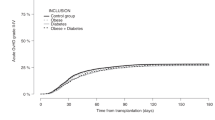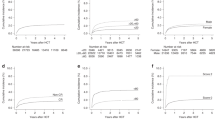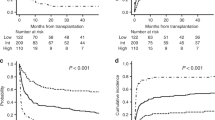Abstract
In order to clarify the association between hyperglycemia during the early period after allogeneic stem cell transplantation (allo-SCT) and adverse outcomes, we retrospectively analyzed 563 consecutive patients who underwent allo-SCT at our institute between 2008 and 2015. Patients were categorized into three groups according to mean fasting blood glucose levels on days 0–7 (normoglycemia group<110 mg/dL, n=347; mild hyperglycemia group 110–149 mg/dL, n=192 and moderate/severe hyperglycemia group≥150 mg/dL, n=24). The median follow-up was 2.7 years. Patients in the moderate/severe hyperglycemia group had significantly worse characteristics. The cumulative incidences of 2-year non-relapse mortality (NRM) and the probabilities of 2-year overall survival (OS) in the normoglycemia, mild hyperglycemia and moderate/severe hyperglycemia groups were 7.5%, 19% and 29%, respectively (P<0.01), and 69%, 53% and 33%, respectively (P<0.01). In multivariate analyses, hyperglycemia was an independent predictor of high NRM (vs normoglycemia; mild hyperglycemia, hazard ratio (HR) 2.56, 95% confidence interval (CI) 1.56–4.18; moderate/severe hyperglycemia, HR 4.46, 95% CI 1.92–10.3) and poor OS (vs normoglycemia; mild hyperglycemia, HR 1.54, 95% CI 1.14–2.07; moderate/severe hyperglycemia, HR 1.61, 95% CI 0.89–2.91). In conclusion, hyperglycemia on days 0–7 after allo-SCT was associated with inferior outcomes.
This is a preview of subscription content, access via your institution
Access options
Subscribe to this journal
Receive 12 print issues and online access
$259.00 per year
only $21.58 per issue
Buy this article
- Purchase on Springer Link
- Instant access to full article PDF
Prices may be subject to local taxes which are calculated during checkout




Similar content being viewed by others
References
Horan JT, Logan BR, Agovi-Johnson MA, Lazarus HM, Bacigalupo AA, Ballen KK et al. Reducing the risk for transplantation-related mortality after allogeneic hematopoietic cell transplantation: how much progress has been made? J Clin Oncol 2011; 29: 805–813.
Gooley TA, Chien JW, Pergam SA, Hingorani S, Sorror ML, Boeckh M et al. Reduced mortality after allogeneic hematopoietic-cell transplantation. N Engl J Med 2010; 363: 2091–2101.
Kurosawa S, Yakushijin K, Yamaguchi T, Atsuta Y, Nagamura-Inoue T, Akiyama H et al. Changes in incidence and causes of non-relapse mortality after allogeneic hematopoietic cell transplantation in patients with acute leukemia/myelodysplastic syndrome: an analysis of the Japan Transplant Outcome Registry. Bone Marrow Transplant 2013; 48: 529–536.
Capes SE, Hunt D, Malmberg K, Gerstein HC . Stress hyperglycaemia and increased risk of death after myocardial infarction in patients with and without diabetes: a systematic overview. Lancet 2000; 355: 773–778.
Capes SE, Hunt D, Malmberg K, Pathak P, Gerstein HC . Stress hyperglycemia and prognosis of stroke in nondiabetic and diabetic patients: a systematic overview. Stroke 2001; 32: 2426–2432.
Krinsley JS . Association between hyperglycemia and increased hospital mortality in a heterogeneous population of critically ill patients. Mayo Clin Proc 2003; 78: 1471–1478.
Falciglia M, Freyberg RW, Almenoff PL, D'Alessio DA, Render ML . Hyperglycemia-related mortality in critically ill patients varies with admission diagnosis. Crit Care Med 2009; 37: 3001–3009.
Van den Berghe G, Wilmer A, Hermans G, Meersseman W, Wouters PJ, Milants I et al. Intensive insulin therapy in the medical ICU. N Engl J Med 2006; 354: 449–461.
van den Berghe G, Wouters P, Weekers F, Verwaest C, Bruyninckx F, Schetz M et al. Intensive insulin therapy in critically ill patients. N Engl J Med 2001; 345: 1359–1367.
Investigators N-SS, Finfer S, Chittock DR, Su SY, Blair D, Foster D et al. Intensive versus conventional glucose control in critically ill patients. N Engl J Med 2009; 360: 1283–1297.
Marik PE, Preiser JC . Toward understanding tight glycemic control in the ICU: a systematic review and metaanalysis. Chest 2010; 137: 544–551.
Fuji S, Einsele H, Savani BN, Kapp M . Systematic nutritional support in allogeneic hematopoietic stem cell transplant recipients. Biol Blood Marrow Transplant 2015; 21: 1707–1713.
Sorror ML, Maris MB, Storb R, Baron F, Sandmaier BM, Maloney DG et al. Hematopoietic cell transplantation (HCT)-specific comorbidity index: a new tool for risk assessment before allogeneic HCT. Blood 2005; 106: 2912–2919.
Takano K, Fuji S, Uchida N, Ogawa H, Ohashi K, Eto T et al. Pre-transplant diabetes mellitus is a risk factor for non-relapse mortality, especially infection-related mortality, after allogeneic hematopoietic SCT. Bone Marrow Transplant 2015; 50: 553–558.
Fuji S, Kim SW, Mori S, Fukuda T, Kamiya S, Yamasaki S et al. Hyperglycemia during the neutropenic period is associated with a poor outcome in patients undergoing myeloablative allogeneic hematopoietic stem cell transplantation. Transplantation 2007; 84: 814–820.
Gebremedhin E, Behrendt CE, Nakamura R, Parker P, Salehian B . Severe hyperglycemia immediately after allogeneic hematopoietic stem-cell transplantation is predictive of acute graft-versus-host disease. Inflammation 2013; 36: 177–185.
Hammer MJ, Casper C, Gooley TA, O'Donnell PV, Boeckh M, Hirsch IB . The contribution of malglycemia to mortality among allogeneic hematopoietic cell transplant recipients. Biol Blood Marrow Transplant 2009; 15: 344–351.
Fuji S, Kim SW, Mori S, Kamiya S, Yoshimura K, Yokoyama H et al. Intensive glucose control after allogeneic hematopoietic stem cell transplantation: a retrospective matched-cohort study. Bone Marrow Transplant 2009; 44: 105–111.
Van den Berghe G, Wilmer A, Milants I, Wouters PJ, Bouckaert B, Bruyninckx F et al. Intensive insulin therapy in mixed medical/surgical intensive care units: benefit versus harm. Diabetes 2006; 55: 3151–3159.
Glucksberg H, Storb R, Fefer A, Buckner CD, Neiman PE, Clift RA et al. Clinical manifestations of graft-versus-host disease in human recipients of marrow from HL-A-matched sibling donors. Transplantation 1974; 18: 295–304.
Oken MM, Creech RH, Tormey DC, Horton J, Davis TE, McFadden ET et al. Toxicity and response criteria of the Eastern Cooperative Oncology Group. Am J Clin Oncol 1982; 5: 649–655.
World Health Organization. Obesity: Preventing and Managing the Global Epidemic. Report of a WHO Consultation. WHO Technical Report Series; 894. World Health Organization: Geneva, Switzerland, 2000. http://apps.who.int/iris/handle/10665/42330.
Armand P, Kim HT, Logan BR, Wang Z, Alyea EP, Kalaycio ME et al. Validation and refinement of the Disease Risk Index for allogeneic stem cell transplantation. Blood 2014; 123: 3664–3671.
Kanda Y . Investigation of the freely available easy-to-use software 'EZR' for medical statistics. Bone Marrow Transplant 2013; 48: 452–458.
Dungan KM, Braithwaite SS, Preiser JC . Stress hyperglycaemia. Lancet 2009; 373: 1798–1807.
Inzucchi SE . Clinical practice. Management of hyperglycemia in the hospital setting. N Engl J Med 2006; 355: 1903–1911.
Fuji S, Rovo A, Ohashi K, Griffith M, Einsele H, Kapp M et al. How do I manage hyperglycemia/post-transplant diabetes mellitus after allogeneic HSCT. Bone Marrow Transplant 2016; 51: 1041–1049.
Engelhardt BG, Jagasia SM, Crowe JE Jr, Griffith ML, Savani BN, Kassim AA et al. Predicting posttransplantation diabetes mellitus by regulatory T-cell phenotype: implications for metabolic intervention to modulate alloreactivity. Blood 2012; 119: 2417–2421.
Johnpulle RA, Paczesny S, Jung DK, Daguindau E, Jagasia MH, Savani BN et al. Metabolic complications precede alloreactivity and are characterized by changes in ST2 signaling. BMT Tandem Meetings 2016. Hawaii Convention Center: Honolulu, Hawaii, 2016.
Reichenbach DK, Schwarze V, Matta BM, Tkachev V, Lieberknecht E, Liu Q et al. The IL-33/ST2 axis augments effector T-cell responses during acute GVHD. Blood 2015; 125: 3183–3192.
Vander Lugt MT, Braun TM, Hanash S, Ritz J, Ho VT, Antin JH et al. ST2 as a marker for risk of therapy-resistant graft-versus-host disease and death. N Engl J Med 2013; 369: 529–539.
Acknowledgements
This work was supported by Grants from the National Cancer Research and Development Fund (26-A-26) and the Advanced Clinical Research Organization.
Author contributions
AK and SF designed this study and analyzed the data; all authors wrote the manuscript.
Author information
Authors and Affiliations
Corresponding author
Ethics declarations
Competing interests
The authors declare no conflict of interest.
Additional information
Statement of prior presentation: Presented in abstract form at the 77th annual meeting of the Japanese Society of Hematology, Kanazawa, Japan on October 18, 2015.
Supplementary Information accompanies this paper on Bone Marrow Transplantation website
Rights and permissions
About this article
Cite this article
Kawajiri, A., Fuji, S., Tanaka, Y. et al. Clinical impact of hyperglycemia on days 0–7 after allogeneic stem cell transplantation. Bone Marrow Transplant 52, 1156–1163 (2017). https://doi.org/10.1038/bmt.2017.27
Received:
Revised:
Accepted:
Published:
Issue Date:
DOI: https://doi.org/10.1038/bmt.2017.27



